PREVIOUS
The Election commission of India and Elections History - Part 3
May 3 , 2024
353 days
1738
0
(இதன் தமிழ் வடிவத்திற்கு இங்கே சொடுக்கவும்)
Model code of conduct for the guidance of political parties and candidates:
General Conduct:
Non-aggravation of Differences:
- Parties should refrain from actions that deepen societal divides.
- To avoid statements or activities that fuel animosity between different groups.
- To promote harmony and understanding among diverse communities.
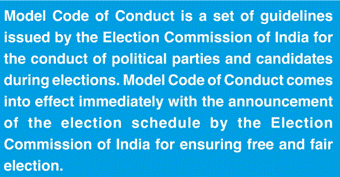
Restricted Criticism:
- Critiques of opposing parties should focus on policies and actions.
- To avoid personal attacks or spreading unverified allegations.
- Maintain a constructive discourse centered on political agendas and achievements.
No Appeal to Caste or Religion:
- Prohibit the use of caste or religious sentiments to sway votes.
- To avoid election campaigns in places of worship to uphold secularism.
- Ensure that electoral messaging is inclusive and does not target specific religious or caste groups.
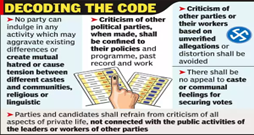
Avoidance of Corrupt Practices:
- Strictly prohibit actions such as bribery, intimidation, or voter impersonation.
- Adhere to electoral laws regarding campaign conduct, including proximity to polling stations.
- Refrain from holding public meetings during the 48-hour silence period before polling.
Respect for Private Life:
- Respect individuals' privacy regardless of political differences.
- To avoid organizing protests or demonstrations at personal residences.
- Acknowledge and uphold the right to a peaceful home-life amidst political activities.
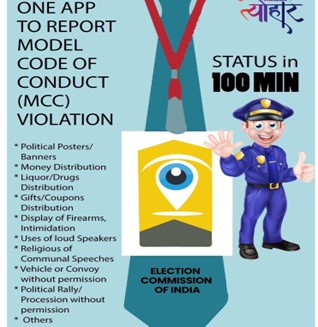
Responsible Use of Resources:
- Obtain explicit permission before utilizing private property for campaign purposes.
- Ensure proper authorization for displaying party materials like banners or posters.
- Respect property rights and avoid unauthorized use of land or buildings for political activities.
Respect for Opposition Events:
- Prevent supporters from disrupting or obstructing rival party meetings or processions.
- Prohibit party workers from causing disturbances or distributing propaganda at events organized by other parties.
- Maintain respect for the democratic process by refraining from removing or defacing rival party posters.
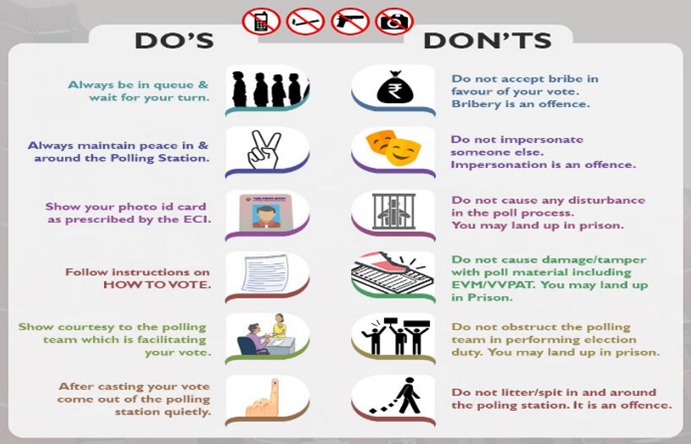
Meetings
- Parties should inform local police well in advance about the venue and timing of proposed meetings to allow for adequate arrangements to manage traffic and maintain peace and order.
- This ensures that law enforcement can prepare and deploy resources effectively to handle any potential issues that may arise during the event.
- Before conducting a meeting, parties must ensure they are aware of any restrictive or prohibitory orders in place at the chosen location.
- If such orders exist, they should be strictly followed to avoid any legal or logistical complications.
- If an exemption is needed, parties should apply for it in advance to ensure smooth proceedings.
- If the use of loudspeakers or other facilities is necessary for the meeting, parties must obtain the required permission or license from the relevant authority well in advance.
- This ensures compliance with regulations and avoids any last-minute complications that may disrupt the event.
- Organizers of meetings should seek assistance from on-duty police officers to handle any disruptions or disorderly conduct by attendees.
- It's important for organizers to refrain from taking matters into their own hands and instead rely on law enforcement to maintain order and resolve conflicts professionally.

Procession
- Parties or candidates planning processions must carefully plan the route, start time, and end time in advance to minimize disruptions and ensure smooth coordination.
- Any deviations from the planned route should be avoided to maintain order and prevent confusion.
- Advance notification to locall police authorities is crucial to facilitate necessary arrangements such as traffic management and crowd control.
- This enables law enforcement to prepare and allocate resources effectively to ensure the safety and security of the procession.
- Organizers should check for any restrictive orders in the areas through which the procession will pass and comply with them accordingly.
- Adherence to traffic regulations and restrictions is essential to prevent any disruptions or accidents during the procession.
- Steps should be taken in advance to ensure the smooth passage of the procession without causing traffic congestion or blockages.
- If the procession is long, organizing it into manageable segments can facilitate traffic flow and prevent disruptions at road junctions.
- Processions should maintain a right-side position on the road as directed by the police to ensure orderly movement and prevent conflicts with other vehicles.
- Compliance with police instructions is essential to maintain safety and prevent accidents.
- Coordination with other political parties or candidates planning processions along the same route is crucial to avoid clashes and minimize disruptions to traffic.
- Contacting the police early and seeking their assistance can help in arriving at mutually satisfactory arrangements.
- Organizers should exercise control over processionists to prevent the misuse of any articles that may incite violence or disorder, especially in moments of heightened emotions or excitement.
- Prohibiting the carrying of effigies representing members of other political parties or leaders, as well as any other forms of provocative demonstrations, is essential to maintain a peaceful and respectful atmosphere during the procession.
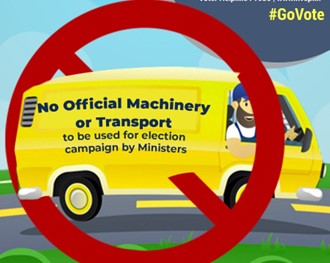
Polling Day
- Parties must assist election officers for peaceful polling, ensuring voters' freedom without obstruction.
- Provide authorized workers with suitable identification badges or cards.
- Ensure identity slips for voters are plain without symbols, candidate or party names.
- Prohibit the serving or distribution of liquor 48 hours before and on polling day.
- Prevent unnecessary crowds near party camps at polling booths to avoid tensions.
- Candidate camps should be modest without posters or propaganda materials, and no food or gatherings.
- Cooperate with authorities on vehicle restrictions, obtaining and prominently displaying permits.
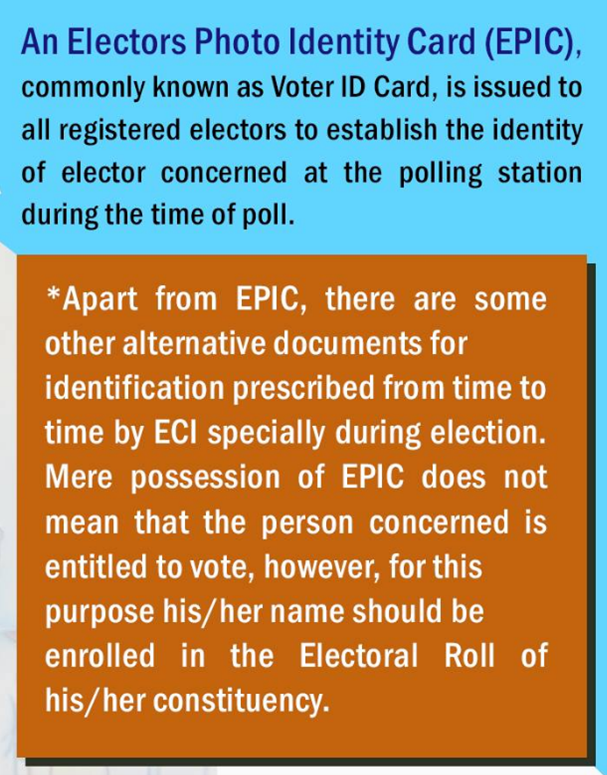
Polling Booth
- Candidates or their representatives can report election issues to appointed Observers, ensuring transparency and fairness in the electoral process.
Party in Power
- To ensure fairness and impartiality during elections, the ruling party, whether at the central or state level, must adhere to the following guidelines:
- Ministers must refrain from using official visits for electioneering purposes and avoid utilizing government resources, including transport and personnel, for partisan interests.
- Public spaces and facilities, such as grounds for election meetings and helipads for air-flights, should not be monopolized by the ruling party.
- Other parties and candidates should have equal access to these resources under similar terms and conditions.
- Government accommodations like rest houses and dak bungalows should not be monopolized by the ruling party or its candidates.
- Fair usage should be ensured for all parties and candidates, with restrictions on using such accommodations for election propaganda.
- The issuance of advertisements at the expense of the public exchequer and the misuse of official mass media for partisan coverage during the election period should be strictly avoided.
- Ministers and authorities should refrain from sanctioning grants or payments from discretionary funds once elections are announced by the Commission.
- Following the announcement of elections by the Commission, ministers and authorities should abstain from:
- Announcing financial grants or promises thereof.
- Laying foundation stones for schemes.
- Making promises regarding construction projects or provision of essential facilities.
- Making ad-hoc appointments in government or public undertakings that may influence voters in favor of the ruling party.
- Ministers of the central or state government should not enter any polling station or place of counting except in their capacity as a candidate, voter, or authorized agent.
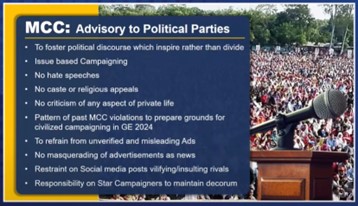
Guidelines on Election Manifestos
- In response to the Supreme Court directive dated July 5, 2013, in SLP(C) No. 21455 of 2008 (S. Subramaniam Balaji Vs Govt. of Tamil Nadu and Others), the Election Commission collaborated with recognized political parties to frame guidelines for election manifestos.
These guidelines aim to ensure fairness and integrity in the electoral process:
Legal Considerations:
- While election promises aren't considered corrupt practices under Section 123 of the Representation of the People Act, 1951, the distribution of freebies can influence voters significantly, potentially compromising the fairness of elections.
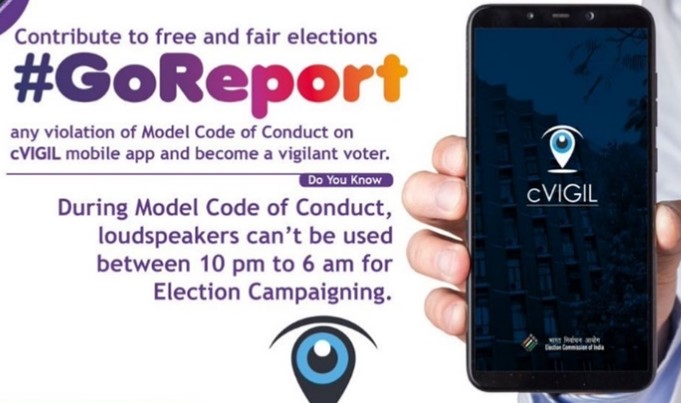
Commission Authority:
- The Election Commission issues guidelines under Article 324 of the Constitution to maintain a level playing field and preserve the purity of elections.
- Although pre-election manifesto releases are beyond the Commission's regulatory authority, exceptions are made considering their direct association with the electoral process.
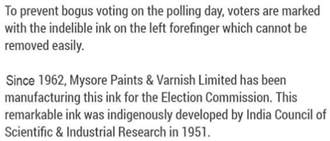
Manifesto Guidelines:
- Manifestos should align with constitutional principles and the Model Code of Conduct, avoiding content contradictory to constitutional ideals.
- While welfare measures promised in manifestos are permissible, parties should avoid pledges that may compromise election integrity or unduly influence voters.
- Manifestos should provide transparent rationale for promises and outline feasible means to fulfil them, ensuring voters' trust is based on realistic commitments.
Release Timing Restrictions:
- Manifestos should not be released during the prohibitory period outlined in Section 126 of the Representation of the People Act, 1951, for single or multi-phase elections, maintaining fairness and impartiality.
-------------------------------------
Leave a Reply
Your Comment is awaiting moderation.


